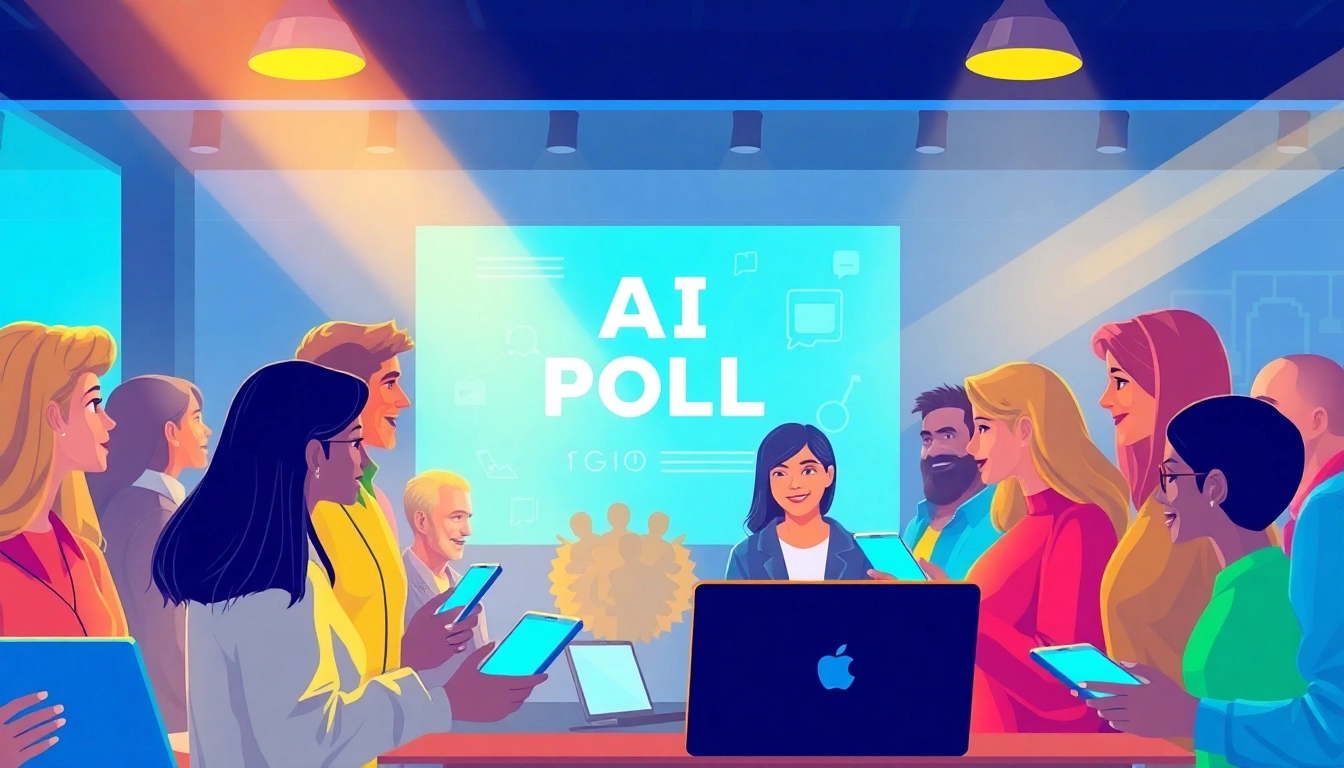
Understanding the Public’s Sentiment Towards AI
The surge in artificial intelligence (AI) technologies has provoked an array of responses from the public, sparking discussions filled with both curiosity and apprehension. To better understand this phenomenon, AI Opinion polls have become vital tools, capturing insights that reveal not just how people engage with AI, but also their deeper feelings and concerns about it. This section delves into the current trends in AI perception, variations in opinions across demographics, and an analysis of what these poll results indicate about our society as it grapples with the rapid evolution of AI technologies.
Current Trends in AI Perception
Recent polls have highlighted a significant divide in how the public perceives artificial intelligence. A survey by Pew Research indicates that 52% of Americans feel more concerned than excited about AI’s growing role in their daily lives, while a mere 10% report feeling more excited than concerned. This reflects a prevailing mood of skepticism, where individuals are wary of AI’s implications for their personal and professional lives.
Furthermore, societal apprehensions have risen against the backdrop of technological advancements, particularly regarding job security and privacy. For example, Gallup’s recent findings underscore that a large portion of the workforce perceives AI as a potential job eliminator rather than a productivity enhancer. These concerns are echoed in various reports, suggesting that the trauma of job loss experienced in past technological transitions significantly shapes current attitudes.
Variations in Opinions Across Demographics
Demographic data plays a crucial role in framing public perceptions of AI. Gender, age, and educational background appear to influence how different groups view this technology. Studies reveal women generally express more caution towards AI compared to men. For instance, a study from Pew Research highlights that women are more prone to perceive AI as a potential threat rather than an opportunity, reflecting broader societal concerns about gendered impacts of technology.
Age is also a determining factor; younger individuals tend to show more optimism towards AI technologies. However, as individuals age, their skepticism appears to grow, likely fueled by a heightened awareness of AI’s possible repercussions, such as job displacement and data privacy issues. Educational background further complicates perceptions, where those with greater familiarity with technology are often more accepting and less fearful of AI advancements.
Analyzing Poll Results: What They Indicate
The data collected from myriad polls offer a nuanced picture of public sentiment towards AI. For example, while many Americans acknowledge the utility of AI in everyday tasks, such as optimizing workplace functions, there exists a significant concern that AI may propagate misinformation. Axios reports that 72% of surveyed individuals harbor a negative opinion of AI’s role in the spread of false information.
Additionally, misinformation and bias resulting from poorly designed AI algorithms amplify public apprehension, underscoring the need for intelligent regulation and ethical oversight in AI development. This complexity indicates that while the capabilities of AI are celebrated, substantial fears surround its efficacy, reliability, and ethical implications.
How AI Opinion Polls Are Conducted
Understanding how AI opinion polls are conducted is essential for interpreting the results accurately. This section explores the methodologies employed, the challenges researchers face in gathering precise data, and noteworthy case studies that exemplify effective polling practices in the realm of AI.
Methodologies Used in AI Polling
Polling methodologies vary widely, yet effective AI polling typically employs a combination of qualitative and quantitative approaches. Random sampling is critical, ensuring that a diverse set of respondents reflects the population’s demographics. Online surveys have emerged as a popular method, leveraging platforms that allow researchers to reach a broad audience quickly. However, extensive qualitative methods like focus groups can provide deeper insights into specific concerns and sentiments individual respondents may have about AI.
Moreover, experimental designs can also be utilized, where participants may be presented with different situations involving AI to gauge their sentiment variably. This multifaceted approach enhances the reliability of findings and allows for a more comprehensive understanding of public opinion.
Challenges in Gathering Accurate Data
Despite the advancements in polling methodologies, researchers face numerous challenges. One primary hurdle is biases inherent in self-reported data; respondents may give socially desirable answers instead of their true sentiments, especially on controversial topics like AI. Inconsistent interpretations of AI’s role can also skew results, as individuals might define AI differently based on their knowledge or experiences.
Another challenge lies in reaching underrepresented groups within the population, where lack of access to technology can hinder participation in online polls. Effective outreach strategies, including telephone surveys or community engagement, may be required to ensure diverse viewpoints are captured in any AI opinion polling initiative.
Case Studies of Effective AI Polls
Several notable case studies exemplify effective polling in understanding public sentiment regarding AI. For instance, the “Global Public Opinion on Artificial Intelligence” survey conducted across multiple countries offered insights into cross-cultural differences in AI perception, showing varying degrees of acceptance and concern depending on local contexts.
Additionally, a collaborative effort by YouGov surveyed opinions about AI in numerous demographics, revealing insights about how professional sectors differ in their views on AI’s potential and challenges. Analysis from these case studies grants valuable lessons in designing AI polls that accurately capture the pulse of public sentiment, shedding light on sound methodologies, data interpretation, and effective communication of results.
The Impact of AI on Society: Survey Findings
The advancement of artificial intelligence significantly impacts society, with various polls highlighting the resultant concerns and opportunities. This section explores the findings surrounding job displacement, public awareness, and knowledge gaps, as well as where positive perspectives can be found.
Concerns Over Job Displacement
One of the most pressing concerns surrounding AI is its effect on employment. Surveys conducted by institutions like Gallup and Bentley University illustrate widespread apprehension that AI could lead to significant job losses. The perception that AI and automation threaten job security has heightened fears, especially in industries heavily reliant on human labor, such as manufacturing and services.
Respondents often cite fears of being replaced by machines or outpaced by the increasingly sophisticated algorithms that AI employs. This anxiety calls attention to the necessity for technological adaptation and education, better equipping the workforce for an augmented reality where AI is an integral collaborator rather than a replacement.
Public Awareness and Knowledge Gaps
While a significant portion of the population acknowledges the existence of AI technology, the level of understanding varies. Polls show that many individuals exhibit knowledge gaps, lacking awareness of how AI functions and the ethical considerations involved. This disconnect can contribute to fear and skepticism.
Forging stronger connections between educational institutions and the public can bridge these knowledge gaps. Panels and workshops on AI literacy can demystify the technology, framing it within an empowering context. More informed individuals are likely to become advocates for responsible AI use rather than opponents.
Positive Perspectives: Where Are They?
Despite the predominant concerns, there are also notable positive perspectives regarding AI. Some polls have found that a sizable portion of individuals recognizes AI’s potential to enhance efficiency and productivity in various fields. For instance, a striking 68% of respondents from a Celonis poll indicated they integrate AI into their workplace, attributing improvements to productivity fueled by AI’s analytical capabilities.
Moreover, sectors such as healthcare are increasingly optimistic about AI’s potential, with technologies poised to revolutionize diagnostics and patient care. By focusing on these positive uses, advocates can help shift the narrative surrounding AI from a negative outlook to one of opportunity and innovation.
Expert Opinions: Insights from Researchers
Expert opinions provide a nuanced understanding of public sentiment towards AI. This section explores insights from researchers concerning current attitudes towards AI, varying views compared to public sentiment, and the crucial role of education in shaping perspectives.
What AI Experts Are Saying
AI experts often see potential that contrasts with general apprehension. They argue that public fears often stem from misunderstandings about what AI can achieve and the safeguards in place to mitigate risks. Researchers from reputable institutions frequently advocate for clear communication surrounding AI’s capabilities to encourage more fruitful public discourse.
Moreover, experts assert that AI should be viewed as a tool for enhancing human capabilities rather than a replacement, noting instances where AI systems have demonstrated effectiveness when augmenting human work. They believe public sentiment can evolve with increased understanding and engagement.
Contrasting Views with Public Opinion
While experts possess a more optimistic viewpoint regarding technology, public opinion frequently leans towards skepticism. This disparity highlights the necessity for bridging the gap between expert knowledge and the public’s understanding. For instance, many experts emphasize the ethical frameworks needed for AI development, yet polls consistently show that general awareness of these frameworks is lacking among the populace.
In this context, fostering dialogue between researchers and the public is imperative. Practicing transparency about research and development processes can promote trust and acceptance while also addressing misinformation and unfounded fears.
The Role of Education in Shaping AI Views
Education plays a crucial role in shaping AI perceptions. Experts recommend educational initiatives targeting varying demographics, focusing on understanding both the benefits and limitations of AI technologies. Universities and tech companies can collaborate to develop curricula that emphasize ethical AI practices, data literacy, and critical thinking about technology’s impact on society.
Engagement strategies targeting younger audiences may cultivate a generation that not only embraces AI innovations but also actively participates in ethical discussions surrounding its development and application. This proactive educational approach can foster a well-informed public that contributes positively to shaping the future of AI.
Future Directions for AI Research and Polling
As public sentiment continues to evolve, so too must the practices surrounding AI opinion polling and research. This section examines emerging topics, the impact of technology on public interactions with polls, and the preparation for the next wave of AI integration into society.
Emerging Topics in AI Polling
With the rapid pace of AI development, new topics emerge constantly, necessitating adaptive polling strategies. Areas of growing interest include ethical AI deployment, bias in AI algorithms, and the environmental impact of AI technologies. Polling efforts must be agile, allowing researchers to adapt questions rapidly to capture changing sentiments and emerging issues.
Moreover, exploring the intersection of AI with various industries, such as finance, healthcare, and public policy, will allow researchers to gauge opinions within these critical sectors. This adaptability ensures that polling remains relevant and reflective of real-world concerns.
How Technology Affects Public Interaction
The integration of digital technology has transformed public engagement with polls. Online platforms have made participation more accessible, yet they also necessitate maintaining engagement in a landscape full of misinformation and competing narratives. Researchers must employ robust strategies that emphasize authenticity and urgency to encourage honest feedback.
Furthermore, the use of AI-driven analytics can enhance polling methodologies, allowing for more in-depth analysis of sentiments expressed across diverse groups. Leveraging AI tools in polling not only streamlines processes but enriches the quality of insights gathered.
Preparing for the Next Wave of AI Integration
Preparing society for the next wave of AI integration requires a multifaceted approach involving education, transparency, and collaborative efforts among stakeholders. As individuals become more acquainted with AI applications, public support may shift, reflecting greater trust in the technology.
Establishing mechanisms for ongoing public dialogue will allow society to navigate the complexities of AI alongside its advancements. Moreover, encouraging public participation in discussions about ethical AI practices can ensure that a wide array of voices are heard as the world embraces these technologies.








